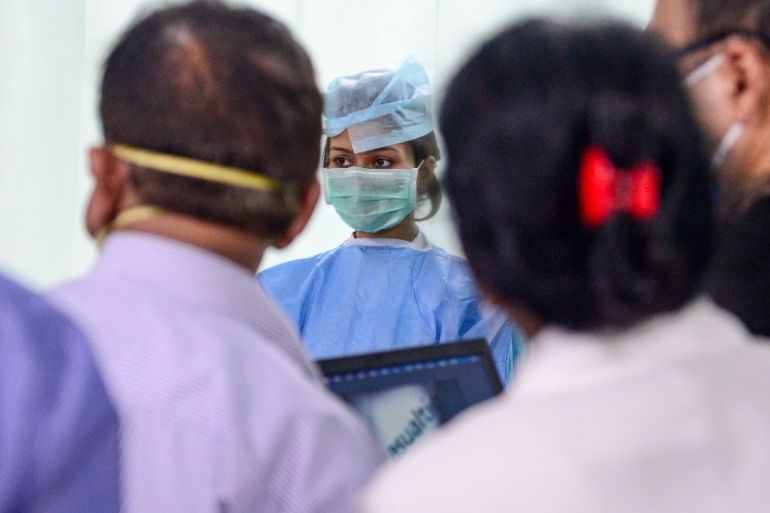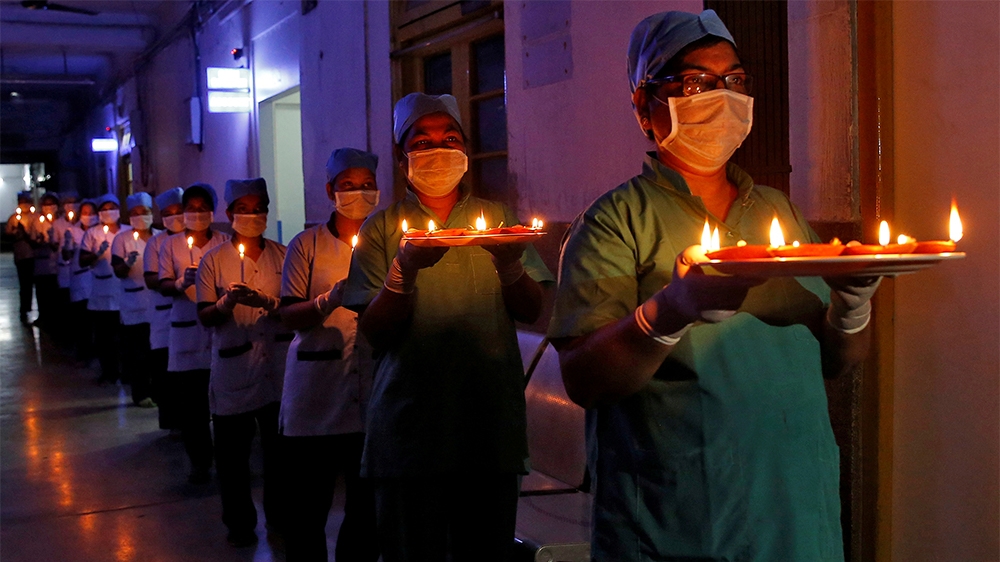Indian doctors face censorship, attacks as they fight coronavirus
Doctors complain of intimidation for reporting shortage of safety kits, and attacks over suspicion they carry infection.

New Delhi, India – On March 28, when Kolkata-based oncologist Indranil Khan received images of doctors wearing raincoats in the COVID-19 ward of a government hospital, he shared them on Twitter.
The next day, the West Bengal state health department assured him that “immediate steps” would be taken to reject “substandard” personal protective equipment (PPE).
Keep reading
list of 3 itemsIndia’s poor testing rate may have masked coronavirus cases
India’s sex workers fight for survival amid coronavirus lockdown
Within two hours of that assurance, Khan was detained by police for questioning.
“I was released the next day only after I posted on social media that the state government is working hard for doctors,” the 31-year-old doctor, who was charged with causing communal disharmony and criminal intimidation, told Al Jazeera.
Khan moved a local court to contest the charges. The court observed that no government can intimidate doctors, even those who brought “disrepute” to it.
West Bengal police official Gyanwant Singh, who is authorised to speak on the matter, did not respond to Al Jazeera’s calls and messages seeking clarification.
Doctors of AIIMS, RML, Lady Hardinge Medical College & allied hospitals refused to donate in #PMCaresFunds They asked authorities to stop mandatory cuts of our salaries & instead provide us PPEs, security, accommodation, transportation & high risk allowance #DocsNeedCare pic.twitter.com/8kAbMJmuoz
— Harjit Singh Bhatti (@DrHarjitBhatti) April 12, 2020
Social media posts gagged
With 1.2 million doctors, the doctor-population ratio in India is 1:1456, much lower than the World Health Organization’s recommendation of 1:1000.
Yet, doctors across India have been reprimanded for highlighting the government’s inefficiency in providing them adequate protective gear to fight the pandemic.
Recently, four doctors of New Delhi’s Hindu Rao Hospital bore the brunt of the authorities for highlighting the lack of PPE. The doctors were threatened with dismissal.
The federal government’s Safdarjung Hospital in New Delhi asked the administrators of their WhatsApp groups to provide their names, phone numbers and email IDs to share the details with the police.
The hospital’s medical superintendent Balvinder Singh Arora told Al Jazeera the circular “will work as a deterrent for people who spread fake news regarding PPE shortage on WhatsApp”.
Despite Al Jazeera’s repeated requests for data on the current stock of PPE and N-95 masks, no government official concerned with the matter responded.
In a press statement on Friday, the federal government stated that the availability of PPE with the states has “doubled” and another two million N-95 masks were provided.
Meanwhile, of the nearly 9,000 COVID-19 patients in India, at least 90 are health professionals. On Thursday, a doctor in the central Madhya Pradesh state died of COVID-19.
Doctors fear an inadequate supply of PPE makes them vulnerable to the coronavirus infection.
Supreme Court took note of the various incidents in different parts of the country where medical staff and doctors were attacked and misbehaved with.Court said such incidents are bound to instill a sense of insecurity in Doctors and medical staff. #COVID19 pic.twitter.com/hShYJ5VlPe
— NewsMobile (@NewsMobileIndia) April 8, 2020
AIIMS doctors write to Modi
Srinivas Rajkumar T of the resident doctors’ association at New Delhi’s premier All India Institute of Medical Sciences (AIIMS), said doctors and nurses in their COVID-19 wards were asked to wear the PPE usually worn while examining HIV patients.
“PPE kits meant for examining HIV patients are not equipped to resist droplets, and the coronavirus infection gets transmitted through droplets sneezed out or coughed up by infected patients,” Rajkumar T said.
But those who raised such issues on social media were being intimidated by the authorities, he said.
However, AIIMS director Randeep Guleria told Al Jazeera the health professionals posted in COVID-19 wards were getting PPE and masks that “met the international guidelines”. He “advised” the staffers to discuss their problems “internally and not post them on social media”.
But the AIIMS doctors still wrote to Prime Minister Narendra Modi about the “harsh backlash” they faced from authorities for demanding professional safety equipment.
There has been no response yet from Modi’s office over the letter.
“There is no gag order or censorship on doctors or other health professionals by us,” India’s Minister of Health and Family Welfare, Harsh Vardhan, told Al Jazeera.
“But they must approach the authorities to get their grievances addressed instead of going to social media. They can even write to me,” he said.
Rajan Sharma of the Indian Medical Association (IMA), a voluntary national body of doctors, added: “Doctors can come to us and not sensationalise problems.”
However, geriatrician Harjit Singh Bhatti, who started a social media campaign called “DocsNeedGear”, argued: “The aim is not to sensationalise problems but to make the voices heard.”

Recently, doctors in Indian-administered Kashmir were also threatened with “strict action” and up to six months’ jail for speaking against the government’s alleged failures in a circular.
“It [the circular] was for a group of health professionals who were using social media for a blame game,” the Himalayan region’s director of health services, Samir Mattoo, told Al Jazeera.
But Owais H Dar, the general secretary of Kashmir Doctors’ Association, said the doctors were sharing “only the truth” because they know the “ground realities”.
Political scientist Ajay Gudavarthy told Al Jazeera that by censoring doctors, the government was attempting to create “a sense of false self-image that covers up its limitations”.
Epidemiologist Jayaprakash Muliyil warned the authorities that censoring information would only add more confusion to the existing chaos.
“Doctors are busy fighting the pandemic, they don’t want to start a fight with the government,” he told Al Jazeera.
Harrasing doctors is not helping. Let's stand together in this and make it a better place to survive in. #covidindia @narendramodi @PMOIndia @AmitShah @MHOIndia Make attacks on Doctors a non-bailable offence – Sign the Petition! https://t.co/U07wTv86ES via @ChangeOrg_India
— Priyanka (@ABHINAHIYAAR) April 12, 2020
‘Fight inside and outside hospitals’
Besides facing censorship from the government on speaking out, Indian doctors have also faced attacks and social boycotts.
Last week, two female doctors at Safdarjung Hospital were assaulted by a resident for “spreading coronavirus infection”.
In the western state of Gujarat, a mobile video of a female doctor harassed by her neighbour for working with COVID-19 patients went viral on social media.
In Madhya Pradesh, health workers were attacked as they visited a neighbourhood to test some residents. Junior doctors in the southern Telangana state were labelled “dirty”.
On March 27, Al Jazeera reported that many doctors and health workers across India were evicted from their rental houses over fear of contracting the infection.
“I frantically looked for alternative accommodation but nobody offered one,” Shamima Yasmin, 23, a medical nurse in West Bengal’s Murshidabad district, who was among those evicted from her home, told Al Jazeera.
The IMA condemned the social boycott of doctors.
But Bhatti said the medical body “did nothing” beyond the condemnation. “The doctors continue to fight their own battle – inside and outside hospitals.”